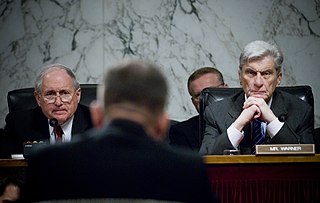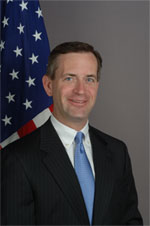
United States Department of State (DOS), or simply the State Department, is an executive department of the U.S. federal government responsible for the country's foreign policy and relations. Equivalent to the ministry of foreign affairs of other nations, its primary duties are advising the U.S. president on international relations, administering diplomatic missions, negotiating international treaties and agreements, and representing the U.S. at the United Nations. The department is headquartered in the Harry S Truman Building, a few blocks from the White House, in the Foggy Bottom neighborhood of Washington, D.C.; "Foggy Bottom" is thus sometimes used as a metonym.

The Executive Office of the President (EOP) comprises the offices and agencies that support the work of the president at the center of the executive branch of the United States federal government. The EOP consists of several offices and agencies, such as the White House Office, the National Security Council, and the Office of Management and Budget.

The Office of Management and Budget (OMB) is the largest office within the Executive Office of the President of the United States (EOP). OMB's most prominent function is to produce the president's budget, but it also examines agency programs, policies, and procedures to see whether they comply with the president's policies and coordinates inter-agency policy initiatives.

The Congressional Research Service (CRS) is a public policy research institute of the United States Congress. Operating within the Library of Congress, it works primarily and directly for members of Congress and their committees and staff on a confidential, nonpartisan basis. CRS is sometimes known as Congress' think tank due to its broad mandate of providing research and analysis on all matters relevant to national policymaking.
The United States budget process is the framework used by Congress and the President of the United States to formulate and create the United States federal budget. The process was established by the Budget and Accounting Act of 1921, the Congressional Budget and Impoundment Control Act of 1974, and additional budget legislation.

A congressional committee is a legislative sub-organization in the United States Congress that handles a specific duty. Committee membership enables members to develop specialized knowledge of the matters under their jurisdiction. As "little legislatures", the committees monitor ongoing governmental operations, identify issues suitable for legislative review, gather and evaluate information, and recommend courses of action to their parent body. Woodrow Wilson once wrote, "it is not far from the truth to say that Congress in session is Congress on public exhibition, whilst Congress in its committee rooms is Congress at work." It is not expected that a member of Congress be an expert on all matters and subject areas that come before Congress. Congressional committees provide valuable informational services to Congress by investigating and reporting about specialized subjects.
Congressional staff are employees of the United States Congress or individual members of Congress. The position first developed in the late 19th century, and it expanded significantly during the 20th century. Staffers may work with individual members of Congress, or they may be associated with committees or other organizations that support Congress.

The United States Senate Select Committee on Intelligence is dedicated to overseeing the United States Intelligence Community—the agencies and bureaus of the federal government of the United States that provide information and analysis for leaders of the executive and legislative branches. The Committee was established in 1976 by the 94th Congress.

The U.S. Information and Educational Exchange Act of 1948, popularly called the Smith–Mundt Act, was first introduced by Congressman Karl E. Mundt (R-SD) in January 1945 in the 79th Congress. It was subsequently passed by the 80th Congress and signed into law by President Harry S. Truman on January 27, 1948.
Congressional oversight is oversight by the United States Congress over the Executive Branch, including the numerous U.S. federal agencies. Congressional oversight includes the review, monitoring, and supervision of federal agencies, programs, activities, and policy implementation. Congress exercises this power largely through its congressional committee system. Oversight also occurs in a wide variety of congressional activities and contexts. These include authorization, appropriations, investigative, and legislative hearings by standing committees; which is specialized investigations by select committees; and reviews and studies by congressional support agencies and staff.

The Department of Budget and Management is an executive body under the Office of the President of the Philippines. It is responsible for the sound and efficient use of government resources for national development and also as an instrument for the meeting of national socio-economic and political development goals.
United States Intelligence Community Oversight duties are shared by both the executive and legislative branches of the government. Oversight, in this case, is the supervision of intelligence agencies, and making them accountable for their actions. Generally oversight bodies look at the following general issues: following policymaker needs, the quality of analysis, operations, and legality of actions.
A legislative assistant (LA), legislative analyst, legislative research assistant, or legislative associate, is a person who works for a legislator as a legislative staffer, in a non-partisan capacity at a think tank, research library, law library, law firm, or non-profit organization, or at a government agency as a legislative affairs professional, or in the government relations and regulatory affairs industry by monitoring pending legislation, conducting research, legislative analysis, legislative research, legal research, policy analysis, drafting legislation, giving advice and counsel, making recommendations, and performing some quasi-secretarial duties. There is a diverse array of work experiences attainable within the legislative assistance, legislative affairs, and legislative relations field, ranging between internship, entry-level, associate, junior, mid-senior, and senior level positions.
The Office of Legislative Affairs is a United States Navy function which coordinates activities between the Department of the Navy and the United States Congress.
An earmark is a provision inserted into a discretionary spending appropriations bill that directs funds to a specific recipient while circumventing the merit-based or competitive funds allocation process. Earmarks feature in United States Congress spending policy, and they are present in public finance of many other countries as a form of political particularism.

Matthew A. Reynolds served as the United States' Assistant Secretary of State for Legislative Affairs from October 6, 2008 to January 20, 2009, serving under the 66th Secretary of State Condoleezza Rice. Prior to this appointment he served as the bureau's Principal Deputy Assistant Secretary and intermittently as Acting Assistant Secretary beginning in March 2005.

The Organization of American States Revitalization and Reform Act of 2013 is a bill that was introduced into the United States Senate during the 113th United States Congress. The Organization of American States Revitalization and Reform Act of 2013 would state that it is U.S. policy to: (1) promote democracy, the rule of law, and human rights in the Western Hemisphere; and (2) support the practices and principles expressed in the Charter of the Organization of American States, the American Declaration on the Rights and Duties of Man, the Inter-American Democratic Charter, and other fundamental instruments of democracy. S. 793 would then require the Secretary of State to develop a multiyear strategy to bolster the Organization of American States (OAS) and improve the OAS’s processes for managing its budget and personnel. The act would require the Secretary to provide quarterly briefings to the Congress on the progress of implementing that strategy.

The Department of State Operations and Embassy Security Authorization Act, Fiscal Year 2014 is a bill that was introduced in the United States House of Representatives during the 113th United States Congress. The bill would authorize $17,573,992,000 to be appropriated to improve the security of U.S. Embassies throughout the world.
The following is a timeline of the presidency of Bill Clinton from his inauguration as the 42nd president of the United States on January 20, 1993, to December 31, 1993.










